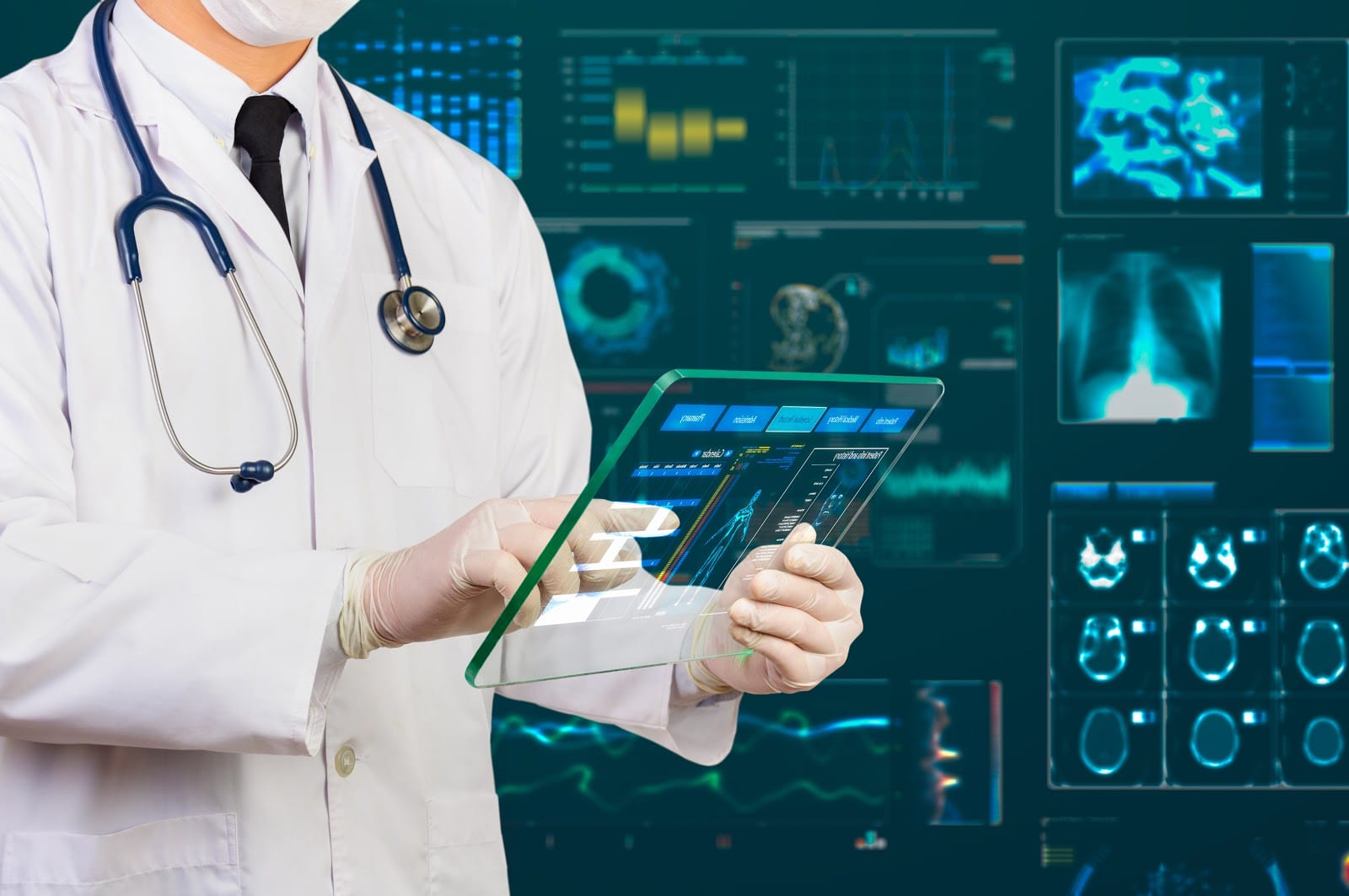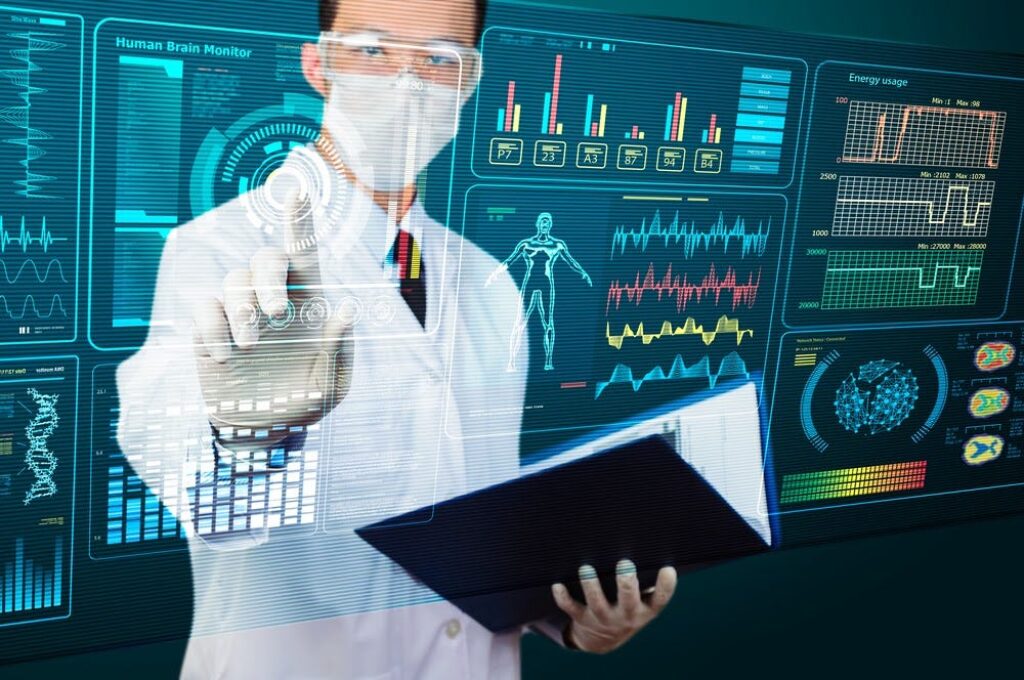
Data science (DS) is the application of scientific methods to data to find the right solution. It is a vast layer of techniques and methods applied to different notions to make an analysis and ensure correct decision-making. Nowadays, the approach is widely used in different spheres, including natural sciences, research, healthcare, etc.
In a broad sense, natural sciences are based on Data Science. For example, a biologist conducts experiments and analyzes the results to test his hypotheses. He must be able to generalize private observations, exclude accidents, and draw correct conclusions.
In the article, we’re going to discuss how data science helps improve the healthcare sector of the economy. We’ll focus on its benefits, specifics, and techniques and explain how AI methods allow for simplifying multiple processes of our routine lives.
Table of Contents
Defining Data Definition and its Role in Healthcare

Source: prognocis.com
If we consider data science in the healthcare industry, the term is used to denote a field of study that uses a scientific method to gain knowledge related to the medical industry and interpret data patterns. Data science implies the use of different technologies, such as informatics and statics, for data collection and processing. A data scientist has a wide knowledge base in designing algorithms and software to collect information and structure it in sets according to different parameters.
Benefits of Data Science for Healthcare
The implementation of DS technologies allows for improving the healthcare sector and providing specialists with wide functionalities for their research practices. The main advantages include:
- Reduced failures in treatment. By making more precise predictions, data science helps improve patient treatment and care. The implementation of modern methods allows for the identification of potential causes of disease and the improvement of accuracy and diagnosis.
- Lower healthcare expenses. The approach is customized to make the analysis of EHR (Electronic Healthcare Records), which allows for minimizing the probability of using a wrong treatment that was tried previously and preventing hospitalization because of the wrong treatment. These features help save funds and reduce expenses.
- Improve drug development. Narrow-specialization research and the integration of AI technologies help save time on clinical testing of new medicines and cope with it using digital tools. Moreover, data science software keeps records about previous tests and research, so researchers can use these findings for new developments.
- Enhanced specialization. Developers use previously obtained information to improve the foundation for treatment, drug development, and diagnosis program creation.
The benefit of data science in the medical field is hard to overestimate. The development of healthcare software is an important step in improving industry efficiency and achieving higher results. If you need a customizable solution for your sphere, you need to contact a custom healthcare software development company, where skilled specialists develop high-quality products for any demand.
Common Cases of Data Science Application in the Healthcare Industry

Source: zucisystems.com
Now, let’s switch to the application of data science in healthcare and consider the most popular cases for using the regarded technologies:
- Medical visualization. Doctors usually use X-ray shots, magnetic resonance images (MRIs), and computerized tomography (CAT) scans to get a look at internal organs. However, in some cases, it can be problematic to observe details on scans. The use of DS software allows for improved visualization and a highly precise look at the internal state of the body.
- Pharmaceutical development. The integration of DS software helps speed up and improve the quality of pharmaceutical research. For instance, software can provide all the historical data on chemical components and the compatibility of elements, which eliminates the need to do new research and saves time. The results of calculations made by AI help predict the efficiency of medicine.
- Predictive modeling and analytics. This sphere of healthcare greatly relies on data science since it deals with finding patterns in human genetics, conditions, symptoms, and environments. This data helps specialists understand the causes of illness and the efficiency of treatment better.
- Vaccine development. Data science analyzes statistical information and helps develop vaccines for deadly diseases quickly and effectively.
- Disease monitoring and prevention. It’s an important sphere of use of data science in healthcare. DS software can predict the outcomes and pace of disease distribution over territory, manage illness development, and define factors that can aggravate or fight its distribution. This feature is helpful in epidemiology.
- Patient healthcare record maintenance. Keeping records about a patient’s health, past illnesses, individual intolerance, etc. helps get quick access and exchange information between physicians and healthcare institutions.
- Virtual assistance. Data science specialists develop apps, in which users can enter their symptoms to track their health condition and learn what vitamins to consume. Such apps provide information about healthcare institutions and suppliers, making the search process easy and comfortable.
- Cyber security. DS software uses advanced security algorithms to guarantee users’ privacy protection and keep their data confidential. The possibility to set access control tools helps filter users who can study information.
The Future of Data Science in Healthcare

Source: medium.com
The role of data science for health and social care is great and hard to overestimate. It transforms the approach to patient diagnostics, treatment, care, and maintenance. The introduction of modern digital methods and advanced software helps improve the efficiency of patient treatment.
In upcoming years, even more attention will be drawn to this sector. The US Bureau of Labor Statistics claims that the number of job places is expected to grow rapidly by 2026. It’s estimated that another 115 million jobs in this segment will be added to the sphere in the next 6 years. Thus, expertise and deep knowledge in the data science sphere will be welcome and help get a good position.
Healthcare and data science are closely tied in the modern world. The latter helps improve the healthcare sector and provide the industry with digital innovations that can simplify processes and research and improve patient treatment. Net trends in the sphere contribute to the optimization of the workflow and achieve higher efficiency in treating patients and maintaining health.







